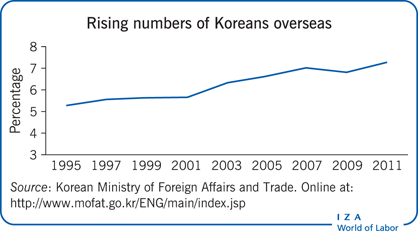Elevator pitch
Since the 1990s, South Korea’s population has been aging and its fertility rate has fallen. At the same time, the number of Koreans living abroad has risen considerably. These trends threaten to diminish South Korea’s international and economic stature. To mitigate the negative effects of these new challenges, South Korea has begun to engage the seven million Koreans living abroad, transforming the diaspora into a positive force for long-term development.

Key findings
Pros
The Korean diaspora continues to grow and now exceeds 7.2 million (11% of the population in 2011).
South Korea is strengthening its ties with Koreans overseas.
In the 1990s, South Korea began to view its diaspora as a valuable asset for the nation’s future.
There is now substantial economic cooperation between businesses in South Korea and those operated by Koreans outside the country.
Brain drain was a concern in the 1960s and 1970s, but South Korea and China are now experiencing the return migration of scientists and engineers.
Cons
Some people oppose engaging the diaspora because Koreans abroad do not fulfill certain civic duties (such as paying taxes and completing military service).
Recognition of dual citizenship has encountered resistance because of South Korea’s strong nationalist tradition.
South Korea’s diaspora engagement policy might be seen as fundamentally ethno-nationalistic.
China, with two million Koreans in its territory, is concerned about South Korea’s policy.